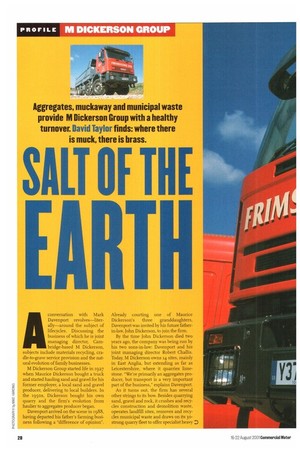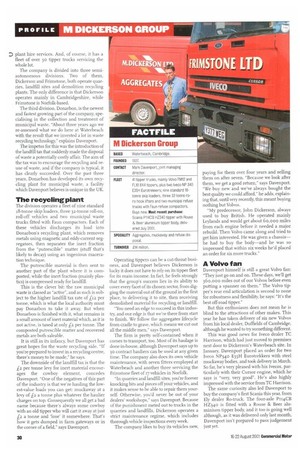SALT FT
Page 28

Page 30

If you've noticed an error in this article please click here to report it so we can fix it.
[ART
Aconversation with Mark Davenport revolves—literally—around the subject of lifecycles. Discussing the business of which he is joint managing director, Cambridge-based M Dickerson, subjects include materials recycling, cradle-to-grave service provision and the natural evolution of family businesses.
M Dickerson Group started life in 1927 when Maurice Dickerson bought a truck and started hauling sand and gravel for his former employer, a local sand and gravel producer, delivering to local builders. In the 195os, Dickerson bought his own quarry and the firm's evolution from haulier to aggregates producer began.
Davenport arrived on the scene in 19g8, having departed his father's fanning business following a "difference of opinion".
Already courting one of Maurice Dickerson's three granddaughters, Davenport was invited by his future fatherin-law, John Dickerson, to join the firm.
By the time John Dickerson died two years ago, the company was being run by his two sons-in-law: Davenport and his joint managing director Robert Challis. Today, M Dickerson owns 14 sites, mainly in East Anglia, but extending as far as Leicestershire, where it quarries limestone. "We're primarily an aggregates producer, but transport is a very important part of the business," explains Davenport.
As it turns out, the firm has several other strings to its bow. Besides quarrying sand, gravel and rock, it crushes and recycles construction and demolition waste, operates landfill sites, removes and recycles municipal waste and draws on its 30strong quarry fleet to offer specialist heavy
plant hire services. And, of course, it has a fleet of over 50 tipper trucks servicing the whole lot.
The company is divided into three semiautonomous divisions. Two of them. Dickerson and Frirnstone, both operate quarries, landfill sites and demolition recycling plants. The only difference is that Dickerson operates mainly in Cambridgeshire, while Frimstone is Norfolk-based.
The third division, Donarbon, is the newest and fastest growing part of the company, specialising in the collection and treatment of municipal waste. "About three years ago we re-assessed what we do here at Waterbeach with the result that we invested a lot in waste recycling technology," explains Davenport.
The impetus for this was the introduction of the landfill tax that suddenly made the disposal of waste a potentially costly affair. The aim of the tax was to encourage the recycling and reuse of waste, and if the company is typical, it has clearly succeeded. Over the past three years, Donarbon has developed its own recycling plant for municipal waste, a facility which Davenport believes is unique in the UK.
The recycling plant
The division operates a fleet of nine standard 18-tonne skip loaders, three 32-tonne roll-on, roll-off vehicles and two municipal waste trucks fitted with Faun compactors. Each of these vehicles discharges its load into Donarbon's recycling plant, which removes metals using magnetic and eddy-current segregators, then separates the inert fraction from the "putrescible" matter (stuff that's likely to decay) using an ingenious macerafion technique.
The putrescible material is then sent to another part of the plant where it is composted, while the inert fraction (mainly plastics) is compressed ready for landfill.
This is the clever bit: the raw municipal waste is classed as "active", and as such is subject to the higher landfill tax rate of LI2 per tonne, which is what the local authority must pay Donarbon to take it away. But when Donarbon is finished with it, what remains is a small amount of inert material which, as it is not active, is taxed at only fa per tonne. The composted putrescible matter and recovered metals are both saleable.
It is still in its infancy, but Davenport has great hopes for the waste recycling side. "If you're prepared to invest in a recycling centre, there's money to be made," he says.
The downside of the landfill tax is that the f2 per tonne levy for inert material encourages the cowboy element, concedes Davenport. "One of the negatives of this part of the industry is that we're hauling the lowest-value loads you can get: muckaway at a levy of La a tonne plus whatever the haulier charges on top. Consequently we all get a bad name because there's always some cowboy with an old tipper who will cart it away at just f2 a tonne and 'lose' it somewhere. That's how it gets dumped in farm gateways or in the corner of a field," says Davenport.
Operating tippers can be a cut-throat business, and Davenport believes Dickerson is lucky it does not have to rely on its tipper fleet for its main income. In fact, he feels strongly that the group's success lies in its ability to cover every facet of its chosen sector, from digging the material out of the ground in the first place, to delivering it to site, then receiving demolished material for recycling or landfill.
"You need an edge to succeed in this industry, and our edge is that we're there from start to finish. We follow the aggregates lifecycle from cradle to grave, which means we cut out all the middle men," says Davenport.
The firm is pretty self-contained when it comes to transport, too. Most of its haulage is done in-house, although Davenport says up to 30 contract hauliers can be used at any given time. The company also does its own vehicle maintenance, with seven fitters employed at Waterbeach and another three servicing the Frimstone fleet of r7 vehicles in Norfolk.
"In quarries and landfill sites, you're forever knocking bits and pieces off your vehicles, and it makes sense to be able to repair them yourself. Otherwise, you'd never be out of your dealers' workshops," says Davenport. Because of the punishment meted out to trucks in the quarries and landfills, Dickerson operates a strict maintenance regime, which includes thorough vehicle inspections every week.
The company likes to buy its vehicles new, paying for them over four years and selling them on after seven. "Because we look after them, we get a good return," says Davenport. "We buy new and we've always bought the best quality we could afford," he adds, explaining that, until very recently, this meant buying nothing but Volvos.
"My predecessor, John Dickerson, always used to buy British. He operated mainly Leylands and would get about 6o ,000 miles from each engine before it needed a major rebuild. Then Volvo came along and tried to get him interested. He was given a chassis— he had to buy the body—and he was so impressed that within six weeks he'd placed an order for six more trucks."
A Volvo fan
Davenport himself is still a great Volvo fan: "They just go on and on. These days, we'll get 360,000 miles out of our Volvos before even putting a spanner on them." The Volvo tipper's rear end articulation is second to none for robustness and flexibility, he says: "It's the best off-road tipper."
But this enthusiasm does not mean he is blind to the attractions of other makes. This year he has taken delivery of six new Volvos from his local dealer, Duffields of Cambridge, although he wanted to try something different.
This was good news for Iveco dealer TC Harrison, which had just moved to premises next door to Dickerson's Waterbeach site. In January, Davenport placed an order for two Iveco NP340 E35H Eurotrekkers with steel muckaway bodies, and took delivery in March. So far, he's very pleased with his Ivecos, particularly with their Cursor engine, which he says is "very, very good". He's also highly impressed with the service from IC Harrison.
The same curiosity also led Davenport to buy the company's first Scania this year, from Ely dealer Ro-truck. The four-axle Pri4CB HZ340 is fitted with a Rouse & Beer aluminium tipper body, and it too is going well although, as it was delivered only last month, Davenport isn't prepared to pass judgement just yet.
























































































































